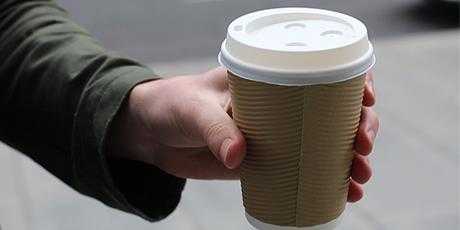LONDON, UK – The Environmental Audit Committee called on the UK Government to introduce a 25p latte levy on disposable coffee cups and for all coffee cups to be recycled by 2023.
The UK throws away 2.5 billion disposable coffee cups
Environmental Audit Committee Chair, Mary Creagh MP, said:
“The UK throws away 2.5 billion disposable coffee cups every year; enough to circle the planet five and a half times. Almost none are recycled and half a million a day are littered. Coffee cup producers and distributors have not taken action to rectify this and Government has sat on its hands.
“The UK’s coffee shop market is expanding rapidly, so we need to kick start a revolution in recycling. We’re calling for action to reduce the number of single use cups, promote reusable cups over disposable cups and to recycle all coffee cups by 2023.”
The Committee has called on the Government to:
- Introduce a 25p “latte levy” on disposable coffee cups, and use the money raised to improve the UK’s recycling ‘binfrastructure’ and reprocessing facilities.
- Set a target that all disposable coffee cups should be recycled by 2023. If this target is not achieved, the Government should ban disposable coffee cups.
- Make producers pay more for packaging which is difficult to recycle.
- Improve labelling to educate consumers about how best to dispose of their cup.
Coffee cup charge
Although some coffee shops provide discounts for customers who bring their own cup, uptake of these offers is low at only 1-2% of coffee purchases. The Committee noted the impact on consumer behaviour of the plastic bag charge (which reduced plastic bag usage by over 83% in the first year), and concluded that consumers are more responsive to a charge than a discount.
The Committee is urging the Government to introduce a 25p charge on disposable cups, to be paid for on top of the price of a coffee. The revenue should be used to invest in reprocessing facilities and binfrastructure to ensure that disposable cups and other food and drink packaging is recycled. As the recycling rate for coffee cups improves, the charge could be lowered.
Mary Creagh MP said:
“A reusable cup is one of the easiest ways to reduce cup waste but the discounts offered by coffee companies are ineffective. The plastic bag charge is proof that charges are highly effective at reducing packaging waste. We urge the Government to introduce a 25p charge on disposable cups.”
100% recycling target and potential ban
The UK throws away 2.5 billion disposable coffee cups every year. Almost all are incinerated, exported or landfilled. Half a million cups are littered every day, which spoils our streets, harms our wildlife and pollutes our seas. Coffee cups are difficult to recycle, but not impossible. Industry action has been voluntary, non-committal and slow.
The Committee urges the Government to set a target that all disposable coffee cups should be recycled by 2023. If this target is not achieved, the Government should ban them.
EAC Chair Mary Creagh MP said:
“Coffee shops have been pulling the wool over customers’ eyes, telling us their cups can be recycled, when less than 1% are. The Government should set a target for all disposable coffee cups to be recycled by 2023. If a sustainable recycling system for disposable coffee cups cannot be set up by this date, they should be banned.”
Producer Responsibility
The plastic liner in coffee cups makes them costly to recycle, but businesses supplying and producing them don’t bear the full environmental costs of their disposal.
The Committee heard that the UK’s producer responsibility obligations, which aim to make producers financially responsible for the disposal of their packaging, “fail the Ronseal test.” Packaging producers only pay for 10% of the cost of packaging disposal and recycling, leaving taxpayers to pay for the remaining 90%.
The Committee is calling on the Government to adopt a producer responsibility compliance fee structure that rewards design for recyclability and raises charges on packaging that is difficult to recycle.
EAC Chair Mary Creagh MP said:
“Taxpayers are footing the bill for disposing of the billions of coffee cups thrown away each year, whether or not they are coffee drinkers. It is only right that producers should bear more of the financial burden to help recycle their packaging, so my Committee is calling for producer responsibility reform that rewards businesses that use sustainable packaging – and makes those that don’t face higher charges.
Labelling: Recyclable but not recycled
Disposable coffee cups are technically recyclable, but most are not recycled. This is because of the cups’ tightly bonded plastic (polyethylene) liner and the complications of recycling packaging contaminated by food or drink.
The UK only has three recycling facilities that can split out the paper and plastic components of coffee cups for recycling. This results in less than 1% of coffee cups being recycled. Most people, however, dispose of their coffee cups in recycling bins believing that they will be recycled.
The Committee has called on the Government to require coffee cups from cafes without in-store recycling systems to be printed with “not widely recycled” labels to boost consumer awareness. Cafes with in-store recycling systems should print their cups with “recyclable in store only.”
EAC Chair Mary Creagh MP said:
“Most people are shocked and dismayed to hear that coffee cups are not recycled. Coffee shops have been sending out mixed messages for years, emphasising that their cups are ‘recyclable’ and staying silent on the fact they are not actually recycled. We’re calling for clearer labelling so people can make informed choices about their use and disposal of coffee cups.”


















